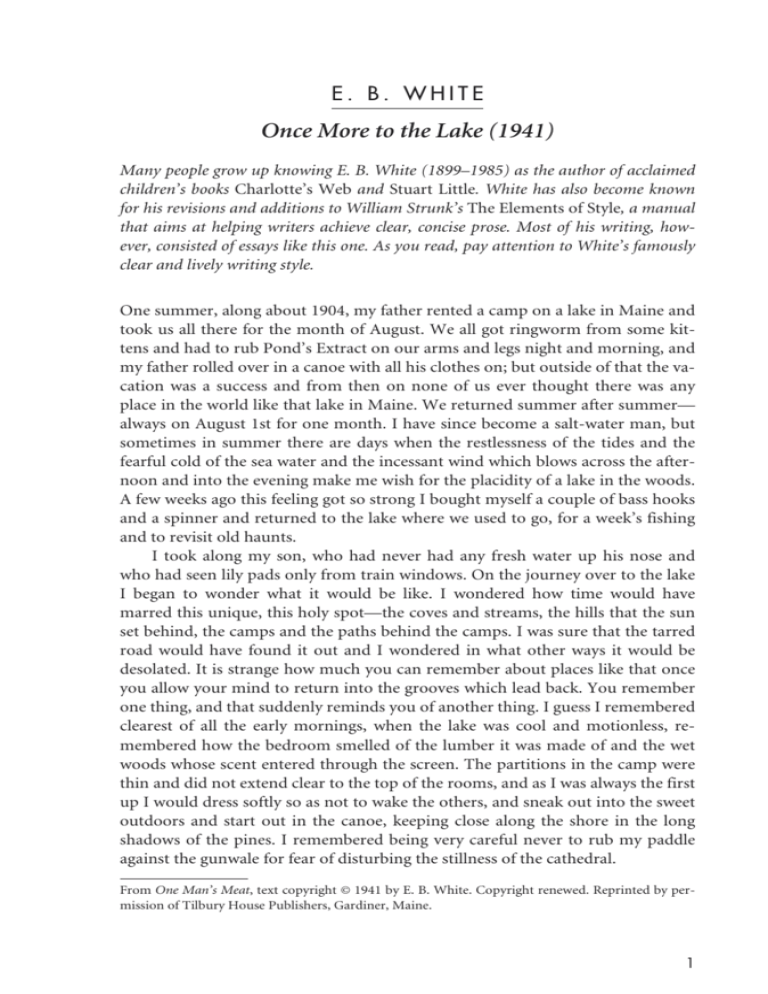
All things change on the basis of the underlying principle that nothing is constant in this world and that every little thing changes. Thus, even though he first views technology as something disruptive, there is also an emphasis on the personal perception factor, which means that White did not like the noise of the new engine and, arguably, did not like the new engine, because of the fact that he wants and expected to see boats with the old engines that he saw in the childhood. Nonetheless, as White continues his story, it is indicated that he has a liking for old engines. Thus, White emphasizes the negative side of new technologies. Even though technology can, indeed, make things become faster and more efficient, technology can also make things noisier and more disruptive. White wants to show that technology can be disruptive. For instance, when White arrives at the lakefront, even though he wishes to enjoy the scene and the experience of being at the lake once again, he becomes somewhat bothered by the noise of the new boats that are on the lake. White wants to emphasize the permanence of some things, or at least the memory of some things, despite the continual change that happens in the world.Įven though the lake did not change, White’s essay indicates that there are some changes in things that are separate from the lake. This means that White considers some things that do not really change in spite of the changes around him and the changes that White experiences in his life. White’s experience brings him to the lakefront, at which he finds himself staring at the same lake, virtually unchanged.

This condition creates an interesting departure from reality into what he wants to see based on his childhood experiences. For instance, instead of viewing the lake as it is, he uses his childhood eyes to perceive the lake. However, the transformation also emphasizes an altered perception of the actual lake. This transformation is necessary for him to find enjoyment in the journey. In effect, his mindset transforms to go back to his childhood. This revisiting is a journey in which White delights in memories associated with his childhood and the lake. He finds that the paved road does, indeed, extend nearly all the way to the lake but is delighted to find that the campsite is more or less the same as he remembers. On his way to the lake, White wonders “how time would have marred” the campsite and whether “tarred road would have found it out”. Although his family’s annual visits to the lake are well in the past, White finds himself longing to go back and plans a vacation with his son. Despite a few interruptions, “the vacation was a success and from then on none of ever thought there was any place in the world like that lake”.

White begins by describing his family’s first visit to the lake in 1904 when he was just five years old. He is clear that his son's maturation is a sign that White is getting closer to death. In his son's image, he no longer sees himself.

#E b white once more to the lake pdf full
By the essay's end, White has come full circle, accepting his own mortality. The essay moves in a non-chronological way, as White weaves in and out of the past and present, following the flow of his mental process, or as what many would call stream-of-consciousness. When he arrives back at the lake, he comments on how everything has stayed the same. He describes all the great memories that were made with his family at this lake, specifically mentioning the times with his father. This essay is a depiction of the writer’s experience as he visits a lake once again – the lake that he has been fond of since childhood. White and first published in 1941, is a story about how the narrator, who grew up going to a lake in Maine, returns with his son when he is older. Once More to the Lake, a narrative non-fiction essay written by E.


 0 kommentar(er)
0 kommentar(er)
